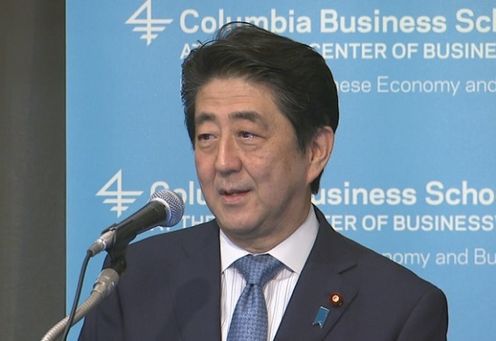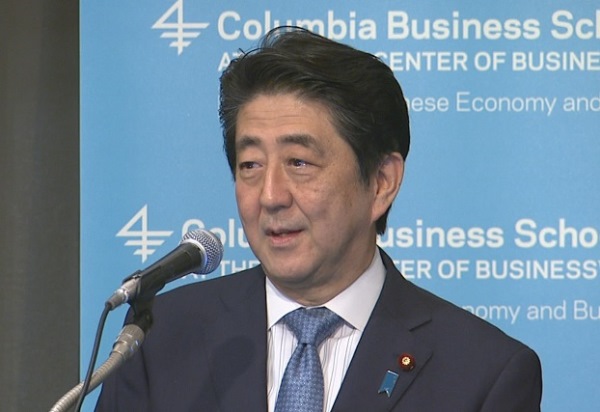Home > News > The Prime Minister in Action > May 2016 > 30th Anniversary Tokyo Conference of the Center on Japanese Economy and Business of Columbia Business School
The Prime Minister in Action
30th Anniversary Tokyo Conference of the Center on Japanese Economy and Business of Columbia Business School
May 13, 2016
[Provisional Translation]
Prime Minister Shinzo Abe attended the 30th anniversary Tokyo Conference of the Center on Japanese Economy and Business (CJEB) of Columbia Business School held in Tokyo.
The Prime Minister made the following remarks,
“Good evening, everyone. I am Shinzo Abe.
First, I want to express my great pleasure at this thirtieth anniversary of the Center on Japanese Economy and Business (CJEB) of Columbia Business School. I would like to thank the CJEB for the consistent and continuous research and communication specializing in Japan that it has produced, under the strong leadership of the CJEB Director, Professor Hugh Patrick, ever since its founding.
Columbia University is a prestigious school, which young people the world over aspire to attend. It is famous for its wide-ranging Japan-related research achievements, as well as the many associated individuals who have produced the greatest thought about Japan, including Professor Emeritus Donald Keene and Professor Emeritus Gerald Curtis. I am truly overjoyed and grateful for the tremendous effort all of you have put into training the next generation, and for the fostering of so many individuals who are supporting the Japan-US relationship in the 21st century, including Professor Weinstein.
Two years ago, when I visited Columbia University, I had the opportunity for dialogue with students who had gathered there from all around the world, and I was able to feel for myself the strong expectations and high interest they had for Japan’s role in resolving global issues. After returning to Japan, I moved quickly to offer a contribution of 5 million dollars to support research on Japan at Columbia.
In addition, last year, I invited 50 students from Columbia University to Japan. I have heard that the experience not only made fans of Japan out of them, but that after they returned to the United States, they communicated to others the true merits of Japan in their presentations about their trip. I hope that this improved people’s opinions about the Abe administration ever so slightly. I am pleased to think that the seeds I planted were able to blossom into flowers and are themselves now steadily spreading new seeds.
When I heard about the presentations, where ideas about Japan which did not rely on preconceived notions were presented, I was reminded of the great work written by Professor Emeritus Patrick 40 years ago, Asia's New Giant: How the Japanese Economy Works. Professor Emeritus Patrick argued that Japan’s ‘miraculous’ economic growth was not miraculous at all, but rather the result of the swift acceptance of new ideas and an attitude of approaching difficult situations head on.
This Japanese attitude has not changed to this day. Over the past three years, I have worked hard to act as a ‘drill’ that can break through the bedrock hampering social change. I have the general feeling that I have shaved away at this bedrock, but I also wonder if some of what I shaved away hasn’t returned. Over this time period, I have received valuable pointers and advice from Professor Joseph Stiglitz, Professor Glenn Hubbard, and others.
Among all my economic policies, the one that is being talked about around the world is Womenomics. We will encourage the active participation of women, and strike a balance between economic growth and improving the birth rate. The greatest challenge related to that is the reform of the way that people work. It is the correction of long work hours. By shifting the active participation of women out of the arena of social policies and into the arena of economic policies over the course of my administration, it can be said that we have taken an ‘issue for only women’ and made it into the issue of everyone across Japan. I absolutely want to see success on this, including success that incorporates Japanese men, who are notorious for not doing much housework.
I myself do the cleaning around the house and take the trash out fairly often. Some have misinterpreted this as a point of contention I have with my wife, who dislikes doing these things, but I often pitch in with the housework.
This will contribute to the resolution of structural issues such as the decline in the birthrate and the aging of the population. We are also constructing a new socioeconomic system, that we are referring to as a ‘society in which all citizens are dynamically engaged,’ in which everyone can play an active role, including both men and women, the elderly and young people, those who have experienced failure, and those with disabilities or fighting an illness. We will put the TPP agreement into effect, which has been advanced by both Japan and the United States, and continue to incorporate overseas vitality into Japan.
The greatest theme of the G7 Ise-Shima Summit to take place two weeks from now will be policy measures to deal with the various problems facing the global economy. During my recent trip to Europe, I had in-depth discussions with the leaders of each country I visited, and I want to continue to exercise leadership toward sustainable, powerful growth of the global economy. This trip renewed my conviction that we must exercise such leadership.
Every time that Japan has been beset by natural disasters, events that we might even call national disasters, we have overcome these challenges through courage and hope. For the recent earthquake as well, the Government is acting as a unified body to exert every effort for reconstruction in solidarity with those affected by the disaster. I want to again express our gratitude for the encouragement and support we have received from countries all over the world, including the United States. I believe that this has been encouraging for the people affected by the disaster as well as everyone else across Japan.
Four months after my inauguration, the CJEB moved ahead of other organizations to hold a seminar on Abenomics. This left an impression on me. I hope that you will continue to communicate to the world the reality of Japan as we work to meet challenges head on. I would like to end my remarks by expressing my wish for CJEB’s continued development over the coming 30 years.”


